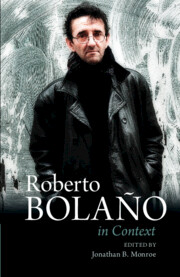Book contents
- Roberto Bolaño in Context
- Roberto Bolaño in Context
- Copyright page
- Contents
- Contributors
- Chronology
- Part I Geographical, Social, and Historical Contexts
- Part II Shaping Events and Literary History
- Part III Genres, Discourses, Media
- Chapter 16 Essays and Short Stories
- Chapter 17 Poetry I: The Ghost That Runs through the Writing
- Chapter 18 Poetry II: Parody and the Question of History
- Chapter 19 The Novel and the Canon
- Chapter 20 Detective Fiction
- Chapter 21 Journalism, Media, Mass Culture
- Chapter 22 Literary Criticism and Literary History
- Part IV Aesthetics, Culture, and Politics
- Further Reading
- Index
Chapter 17 - Poetry I: The Ghost That Runs through the Writing
from Part III - Genres, Discourses, Media
Published online by Cambridge University Press: 15 December 2022
- Roberto Bolaño in Context
- Roberto Bolaño in Context
- Copyright page
- Contents
- Contributors
- Chronology
- Part I Geographical, Social, and Historical Contexts
- Part II Shaping Events and Literary History
- Part III Genres, Discourses, Media
- Chapter 16 Essays and Short Stories
- Chapter 17 Poetry I: The Ghost That Runs through the Writing
- Chapter 18 Poetry II: Parody and the Question of History
- Chapter 19 The Novel and the Canon
- Chapter 20 Detective Fiction
- Chapter 21 Journalism, Media, Mass Culture
- Chapter 22 Literary Criticism and Literary History
- Part IV Aesthetics, Culture, and Politics
- Further Reading
- Index
Summary
This essay discusses Roberto Bolaño as a poet and the place and meaning of his poetry in the totality of his work. It characterizes the author’s writing and figure as writer since its beginning in Mexico City in the mid-seventies, and the fate of his writing after his death. It critically evaluates how critics have considered his poetry as well as key studies on his poetry. It reflects on his role in the formation of Infrarealism and the traces and echoes of Infrarealism in his oeuvre, including the connection of his earlier poetics with the major narrative works and later poetry. In reflecting on Bolaño’s influences, it considers the figure and poetic work of Mario Santiago Papasquiaro, whom Bolaño references constantly in his novels and poetry as a major influence in his life and writing. This article argues that Santiago epitomizes the poet’s rebellion and personal ethics and analyzes his influence on Bolaño’s overall poetics.
Keywords
- Type
- Chapter
- Information
- Roberto Bolaño In Context , pp. 191 - 200Publisher: Cambridge University PressPrint publication year: 2023

